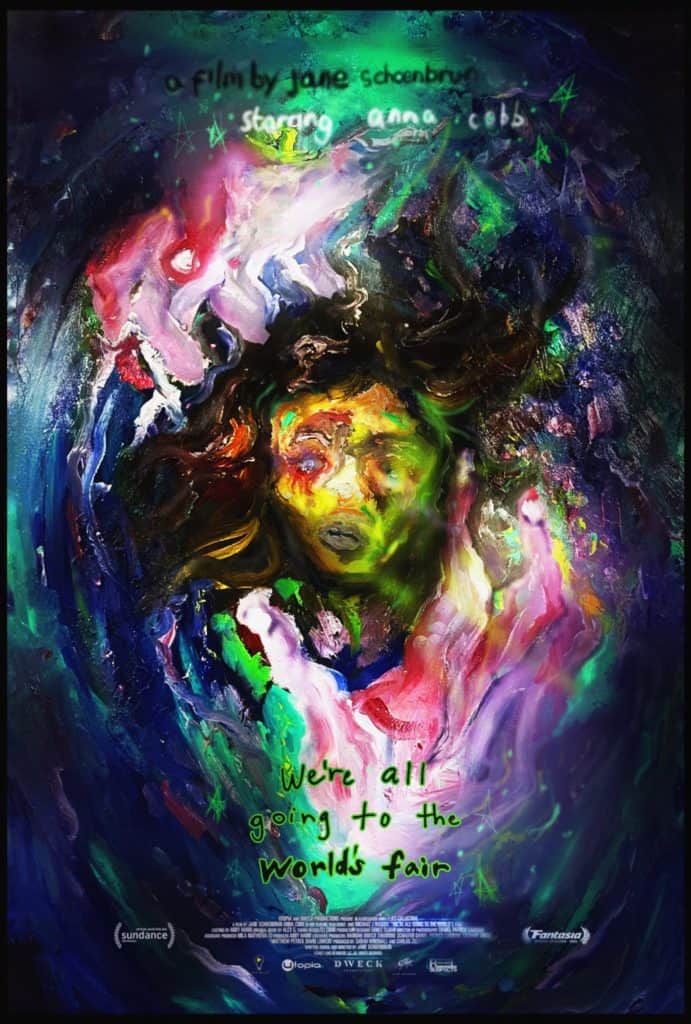
It’s safe to say that Alex G’s score for We’re All Going to the World’s Fair is my favorite score release of the year. He brings a sense of inevitable melancholy to the film, a potentially inevitable dark fate. And it’s intoxicating.
The film follows high school student Casey, trapped in solitude and riddled with teen angst. She then decides to play the online horror “game” the World’s Fair Challenge with the promise that it will drastically change her in some way. Seemingly unhappy with her current life, she needs some change. It works, and she begins to change. But it isn’t necessarily for the better.
The strongest parts of Alex G’s score bookend the film, with “Main Theme” and “End Song”. They’re both largely acoustic affairs, slowly drawn out on his guitar. The chords of the former crawl across your skin, then otherworldly electronics creep into the mix. The track’s vocals are almost those of a child, but distorted, vaguely similar to Casey’s own voice, as if Alex G has taken her dialogue and warped it. There’s a familiar lo-fi acoustic singer-songwriter feel, tinged with something devilishly foreboding. It drastically reframes the opening credits, which show a wintry-grey upstate New York and colorful, hand-drawn titling straight from a 2000s indie flick. Set to any other music we might expect a quirky coming of age dramedy perhaps. But with Alex G’s “Main Theme” something ominous awaits.
From there we move into far more ambient, atmospheric territory. Much of the film takes place through Casey’s live streaming, video chats with fellow World’s Fair Challenge participant JBL, or videos played through a pseudo-YouTube platform, which moments are largely bereft of music (except for, notably, “Typing Game,” which is a throwback 80s track for a retro typing/racing arcade game). In other moments the score is barely noticeable, as minimal strange electronics and occasional guitar strums arrive. These latter elements sometimes play fragments of “Main Theme,” following Casey on her journey through the World’s Fair. Even when the score is there, it hardly is, clocking in at around twenty minutes outside of “Main Theme” and “End Song”.
The film so heavily utilizes videos that it at times seems like a type of found footage movie. Alex G’s score breaks this illusion, thereby cutting against the notion that we’ve discovered some deep in YouTube creepypasta. It’s hard to know to what extent this is intentional, but it feels like a welcome reminder, snapping us back not into our own reality, but the reality of what we’re watching.
It’s the other bookend, “End Song,” that makes this release so powerful for me. Another acoustic guitar-based track, “End Song” is gentler, more caressing than its counterpart “Main Theme”. But there’s something dire tucked away, with Alex G’s haunted voice and the refrain of “You know what they do to little dogs like you” serving as a desperate warning. It’s vaguely reminiscent of HTRK’s album Venus in Leo: intimate melancholy whose sadness pushes you away and yet you can’t listen enough. The repulsion hasn’t been strong enough to keep me at bay, and “End Song” has certainly been my most played film cue of the year.
We’re All Going to the World’s Fair is yet another example of why I’m so supportive of musicians who don’t normally compose for film entering the space. It gives us music that we ordinarily would never hear in the medium. Although Alex G’s score is unlikely to end up on my favorite scores of the year list (largely because outside of the opening and closing songs the score is so sparse), the release is fantastic. It haunts me at every listen and I hesitate to hit play again when it’s over. But inevitably I do.
Editor’s Note: This score also appeared in our writeup of the Best Film Scores of April 2022.
